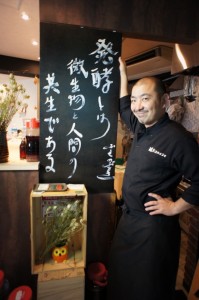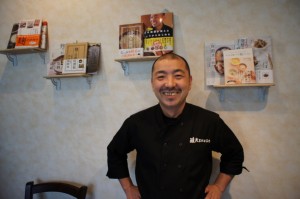2015.08.08 20:53

———“What does fermented food mean to you, Mr. Fushiki?”
To Japanese people, I believe that fermentation is the symbiosis between humans and microorganisms. I think in fermented food you can include food seasoned with certain fermented ingredients, too. The very essence of fermented food is to have microorganisms break down ingredients ahead of time before you cook them, or in some recipes the fermented ingredients are offered as is.
———“When people hear the word fermentation, they think of fermented seasonings such as miso and soy sauce, or fermented ingredients such as natto (fermented soybeans) and umeboshi (pickled plum). When you say fermented food, however, can I think of it as something like food marinated in miso or soy sauce?”
*Miso … salty, fermented soybean paste used for soup, spread, pickling, etc.
That’s right. But the important point here is that the marinating liquid has to contain microorganisms that have enzymes with the ability to break down ingredients. If you marinate ingredients in liquid without them, it might help you preserve food longer, but it is not fermentation. By marinating with liquid with decomposing enzymes, for example, proteins are broken down into amino acids, starches are broken down into glucose, or fats are broken down into fatty acids. Microorganisms break down ingredients into smaller molecules. Then we eat the food. Now this is fermented food.
This process of decomposing will not happen if you use general miso or soy sauce that you buy at supermarkets, because they typically contain no enzymes or microorganisms. Microorganisms are decomposers, and they decompose things using enzymes that are made of proteins so they can live. We use this to our benefit.
If you marinate food with miso that has active fermentation going on, proteins and fats in the food will be decomposed. Now, if you eat food that didn’t go through this such as regular grilled salmon, you will have to do the decomposing of all these things yourself in your body. With fermented food, it is all done ahead of time, so it’s energy efficient and very good for you.
Also, it’s hard for the decomposed ingredients to accumulate in your body because they are now smaller molecules. If you can’t properly break down proteins and fats in your body, it can lead to modern-day illnesses such as allergies and atopic eczema. With fermented food, proteins and fats are broken down in advance, so it’s very good for you. Children with wheat allergy can eat Hishio or wheat miso and have no allergic reaction.
Fermented food is different from rotten food and it poses no harm to human body, but if the fermentation is overdone, you wouldn’t want to taste it. My restaurant has 51-year-old miso. Of course it’s edible, but it smells like a horse stable. It’s like maturation of wine.
If left unattended, alcohol turns into vinegar. Without salt in it, acetic acid bacteria will grow and turn the alcohol into vinegar. Distilled alcohol never turns into vinegar. If acetic acid bacteria are added to wine, it will become wine vinegar, and eventually after a while it will become balsamic vinegar. Japanese sake with acetic acid bacteria will become rice vinegar. Apple cider with the same bacteria will become apple vinegar. You can grow acetic acid bacteria in beer but it doesn’t taste good, so I don’t do that.
The amino acids from decomposed protein contain umami; if the protein is plant-based you get glutamic acid, with animal-based protein you get inosinic acid, and from fungi you get guanylic acid. These are the three major umami ingredients, and the microorganism that can generate them exists basically only in Japan. It’s a mold called koji. (aspergillus)

———“I understand before you focused on fermented food you used to cook mainly Italian and Japanese. What made you decide to work with fermented food?“
It was actually a son of a miso storehouse who gave me his amazake and hishio. As soon as I tasted them, I intuitively knew it would taste great if I marinated salmon in them. When I tried that idea, it tasted much better than I had expected. This caught me by surprise because, as a chef with over two decades of experience, I thought my guesses were pretty good when it comes to taste, but this time my guess was off. Then I started researching and found out about various roles microorganisms and enzymes play.
Before that, when I heard the word enzyme all I could think of was laundry detergents. As I studied more about this, I came to the conclusion that miso and soy sauce are living things. I was quite embarrassed as a professional chef, by how I always thought they were nothing more than ordinary condiments you could get from stores.
Then I realized there must be a lot of chefs who don’t know about this in Japan. Currently my students have been mainly housewives, but my biggest aspiration is to teach other professional chefs about this. I wanted to get them to revisit the important basics. That’s what I had in mind when I first started.




 ジャズ作曲家、挾間美帆、CD制作助成
ジャズ作曲家、挾間美帆、CD制作助成
 音楽家、網守将平、CD・コンサート制作助成
音楽家、網守将平、CD・コンサート制作助成
 音楽プロデューサー、牧村憲一によるコンサート、レクチャー・シリーズの制作
音楽プロデューサー、牧村憲一によるコンサート、レクチャー・シリーズの制作
 和食を世界各地の子供に食べてもらうショート・ムービー“オマカセ・フォー・キッズ”の制作
和食を世界各地の子供に食べてもらうショート・ムービー“オマカセ・フォー・キッズ”の制作